

Nutrition. Wanting Apologies. VANCOUVER — It was between 5 a.m. and 6 a.m. and Elsie Erickson’s mother had just begun lighting the stove when four RCMP officers barged into their tiny wooden home in the village of Krestova, B.C.
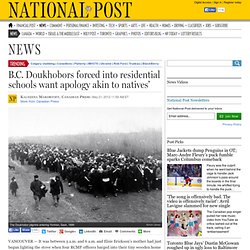
“She came to the bedroom and spoke and said ’Vanya stavai politcia skaya, the police are here,”’ Erickson said. “And from the tone in her voice I jumped out of bed … and I tried to hide.” The seven-year-old had barely scurried under her bed when she was dragged back out by her foot. Nearly 60 years later, she remembers her father asking if the family had time to pray. Erickson and her brother spent the next four years in what she said felt like a jail. They were housed with nearly 200 others in a residential school in New Denver, B.C., all children of a radical sect of Russian immigrants known as the Sons of Freedom Doukhobors.
Now, Erickson and 100 former residents are fighting for an apology styled similar to the redress given to their native peers in 2008. “What kind of an adult do you become?” Personal Stories. Causes, Consequences and Apologies. Lasting Impacts. Sexual Abuse. Native leaders hope Truth and Reconciliation hearings will break the cycle of violence.
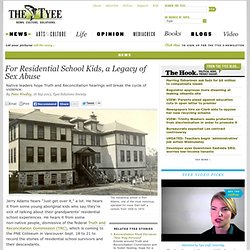
The residential school in Port Alberni, one of the most notorious, operated for more than half a century from 1920 to 1973. Imposing a Culture. Residential School Experience. Tyler Clarke Daily Herald "I'm not going to tell my story because I've heard my story a lot today," former residential school student Marlene Bear said, Thursday.
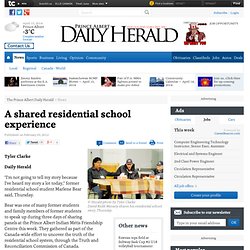
Bear was one of many former students and family members of former students to speak up during three days of sharing panels at the Prince Albert Indian Métis Friendship Centre this week. A Poor Education. John Woods/CP The two schools sit a mere five kilometres apart as the crow flies, in a rural stretch of Manitoba about four hours west of Winnipeg.
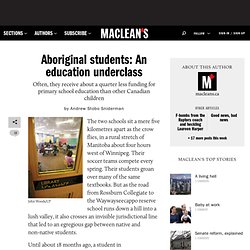
Their soccer teams compete every spring. Their students groan over many of the same textbooks. But as the road from Rossburn Collegiate to the Waywayseecappo reserve school runs down a hill into a lush valley, it also crosses an invisible jurisdictional line that led to an egregious gap between native and non-native students. Until about 18 months ago, a student in Waywayseecappo received about $7,300 in annual funding from the federal government, while a student at Rossburn Collegiate received about $10,500 from the provincial government. After three years of talks, Aboriginal leaders in Waywayseecappo persuaded the provincial and federal governments to let them join the local school board, effectively transforming their Aboriginal students into provincial students. In principle, Canada’s Parliament believes this is repugnant. Residential School System.
Children's dining room, Indian Residential School, Edmonton, Alberta.
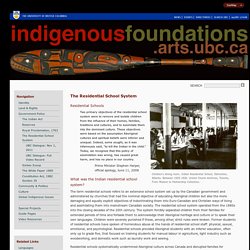
Between 1925-1936. United Church Archives, Toronto, From Mission to Partnership Collection.